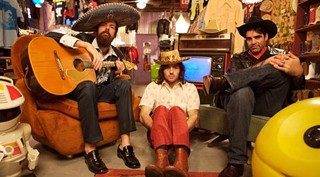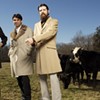Tapping into the grittiness of American roots music - emotionally precise lyrics, tight harmonies and lustily-picked acoustic instruments - the Avett Brothers created a rock ‘n' roll hybrid that feels anything but forced.
Indeed, the band's live shows are usually packed with rock fans just discovering the tactile beauty of acoustic music, and those who love old-time country but never understood the joys of rocking out.
It's quite the musical tightrope, but Scott Avett, Seth Avett and Bob Crawford walk it like Wallendas.
The Avett Brothers broke out of Concord, N.C. (just north of Charlotte) about 10 years ago, and now, five albums into an astonishingly successful indie career, they've evolved into of the most popular bands in America.
Friday's concert in the Johnny Mercer Theatre - the Avetts' first-ever Savannah show - was a near-instant sellout.
As teenagers, Scott and Seth Avett had a good regional run as part of a punky group called Nemo; bassist Crawford joined them just as they began to explore the blood-close harmonies of the Louvin Brothers, the sweet-picking purity of Bill Monroe's Blue Grass Boys, and the robust retro-electric exuberance of Robbie Robertson and the Band.
It was then that Scott (banjo) and Seth (guitar) began furiously writing songs to fit this new/old style.
Eventually, the band came to the attention of legendary producer Rick Rubin (Tom Petty, Johnny Cash, Red Hot Chili Peppers), who signed them to his label, Sony-owned American Recordings.
"The Avetts' songs have such a sincere emotional resonance," Rubin says. "The purity of the messages stops you in your tracks. It's unusual to hear such open-hearted personal sentiment from young artists today."
With solidly-written story-songs, insanely catchy melodies and the sort of maturity that comes from a decade of looking for it, the Rubin-produced I and Love and You is a giant artistic leap for the band.
"It takes true talent to pull off this kind of transition," Paste said of the new album. "It's like Rubin took everything the band does so well and pumped it full of human-growth hormone."
Indeed, as Bob Crawford says in this interview, the more you do something, the better you get at it.
The Avett Brothers story - going from pretty severe hard rock to bluegrass and acoustic music - has always seemed unusual to me.
Bob Crawford: Well, we've been pushed along many years by the fans, by the crowds.
Because of the kind of music we've always played, going back to the beginning, it immediately invited in more diverse walks of life to enjoy it. Like if you are playing "Going Down the Road Feelin' Bad," with a banjo, and upright bass and an acoustic guitar, an 80-year-old woman is going to like it, a 35-year-old married couple with a 6-year-old kid's going to like it ... it's a bigger tent than what a hard rock band is.
Nemo was a five-man hard rock band, it was very raw and had a lot of energy. If you like that kind of music, you know that the people who go see that music are generally males from the age of about 15 to 24, 25. I think that everybody in that band being as young as they were at that time, there was a lot of talent, it kind of imploded upon itself. For personal reasons.
When I first moved to North Carolina in '96, I was in a band for four years. And before you knew it, people were graduating college, people were getting married and having kids, they were moving on with their lives. And probably some of that was the case with Nemo.
But how did guys so young transition backwards, to old-time country music?
Bob Crawford: Because they grew up around it. Their father played it. And their father would play music for them all the time; he took them to see Tom T. Hall when they were kids, and he played John Denver songs for them. He loved old country, and it was always around them. That was the music of their childhood, and I think that you can't appreciate it until you reach a certain age.
Then they reached that age. Scott started playing a banjo, something that reflects his personality a great deal. That was the beginnings of it, and then I came along.
Nemo was still around - we were called Nemo Back Porch Project for the first six months. They were doing both. They didn't look at what we were doing as "the thing," they looked at Nemo as "the thing." And as Nemo began to collapse upon itself, we were playing for crowds of all ages, people were liking it and we were making money, playing covers.
When we began to do the original music, that's when I think it really sunk in for the brothers - because here they could be creative, here they could really walk down that path that they were meant to walk down, as songwriters.
I booked a tour in 2002, completely off the Internet. We played a lot of sports bars, a lot of Irish pubs and such. We played the Midwest. We did 25 shows, and when we came back we realized that we could do it. We made money as individuals, and the band account had money in it. That taught that "This is feasible. We can travel. We can do this."
Was their an element of their songwriting that changed - the realization that you could write more personal or philosophical lyrics outside of the big rock band thing?
Bob Crawford: Yeah, but it was the age. When you're a certain age, your life revolves around certain things. When you are another age, your life revolves around other things. Me observing this whole thing over the past decade, that's what I see in the songwriting.
Each album cycle, and the songs therein, are a cycle of my life. Which, of course, are cycles of their lives. And they've changed as our lives have changed.
The themes in your life today are probably not the same things the same themes as 10 years ago. I think the earlier albums were about girls and cars and traveling. And now they're about family, and death, and the conflicts of aging. And the thought processes that we all develop and go through as we age and move through life. Your priorities change.
However, I will say this too: The more you do something, the better you get at it, the deeper you delve into it. So just as our musicianship has improved over the years, so has the maturity and the crafting our songs. Because you get better at it.
Was there a particular moment when you knew things were changing, getting more successful?
Bob Crawford: We never sat around and talked about success, you know what I'm saying? It was always like "Get up and work." We always worked and good things happened. We worked really hard, we traveled a lot and got up early all the time. We would play a show, then get up at 5 a.m. the next day to go and play the next show. It wasn't like we were living this rock ‘n' roll fantasy life, where we were partying and sleeping in. We had our little run-in with partying for a little while there, but we were younger men then.
Their father had a construction business, and he used to weld bridges. There's a certain amount of partying you allow yourself to do, but you still gotta be up at sunrise to start your day working. That has always been the approach of the business end of what we do. The work ethic of what we do has always been built from that.
But did you see it changing?
Bob Crawford: Yeah, we did. When we signed with our booking agent in 2004, he said it's going to be a hot air balloon ride, not a rocket ship ride. Very true, that. Up until about a year and a half ago, it was gradual. But I will say, it has accelerated. And now it's almost like the cat's out of the bag.
But man, psychologically, and work-ethically, we unwittingly laid the groundwork. And it was really like that baby-steps thing. Because every time we reached what you would consider to be a height, or a new peak, we were ready for it. The pat on the back was very brief. The "atta boys" were brief; they were always for the moment.
For me, Merlefest was this moment - "Whoa, we played MerleFest! All my dreams have come true, all the rest is cream cheese." And then you do Conan O'Brian. And then you do whatever comes next, and then you're at Rick Rubin's house talking about making a record. Then you're playing crazy places in Philadelphia where you used to go see Bob Dylan play.
These things that happened one after another, we took them in stride. We were always appreciative, but it was never the top of the mountain. And hopefully, there isn't a top of the mountain.
Did Rubin lay down any laws? Any edicts - "You should do it this way"?
Bob Crawford: No, he never said that. The first night we met with him, he and Scott and Seth talked about their philosophy on music, and stuff that they like, and they were very much right there with each other. As far as core values about music.
Second of all, Rick would say "We could try this. It might be the worst idea in the world, but let's try it." There were no edicts. He was very hands-off. But we came into that whole dynamic with the mantra "Let's be as flexible as possible. Why work with someone like this if you're not willing to be flexible?"
But he got what you wanted on the record?
Bob Crawford: Very much so. Not only did we get what we wanted, but we learned a lot doing it. In a good way. And that's what you want. Sometimes I look at these experiences like internships. You try to soak up as much as you can, because you don't know what the future's gonna hold for you.
Are you playing electric bass onstage now?
Bob Crawford: I started playing standup with these guys a couple months after I started playing standup. "Pretty Girl From Chile," from Emotionalism, was probably the first time I really played electric bass with them. But now I'd say I play 40 percent of the show on the electric bass.
And I gotta say, I'm addicted to it. I'm lovin' it. It's a whole new world for me, and because of that it's always just a thrill to do it. You know, we've added a drummer for touring, and it feels like a band. Like a full band. And I don't know if that takes away for anybody out there ... however, for us it adds. It's exciting. It's fun.
The Avett Brothers
Where: Johnny Mercer Theatre, Savannah Civic Center
When: At 8 p.m. Friday, June 11
Tickets: Sold out






























